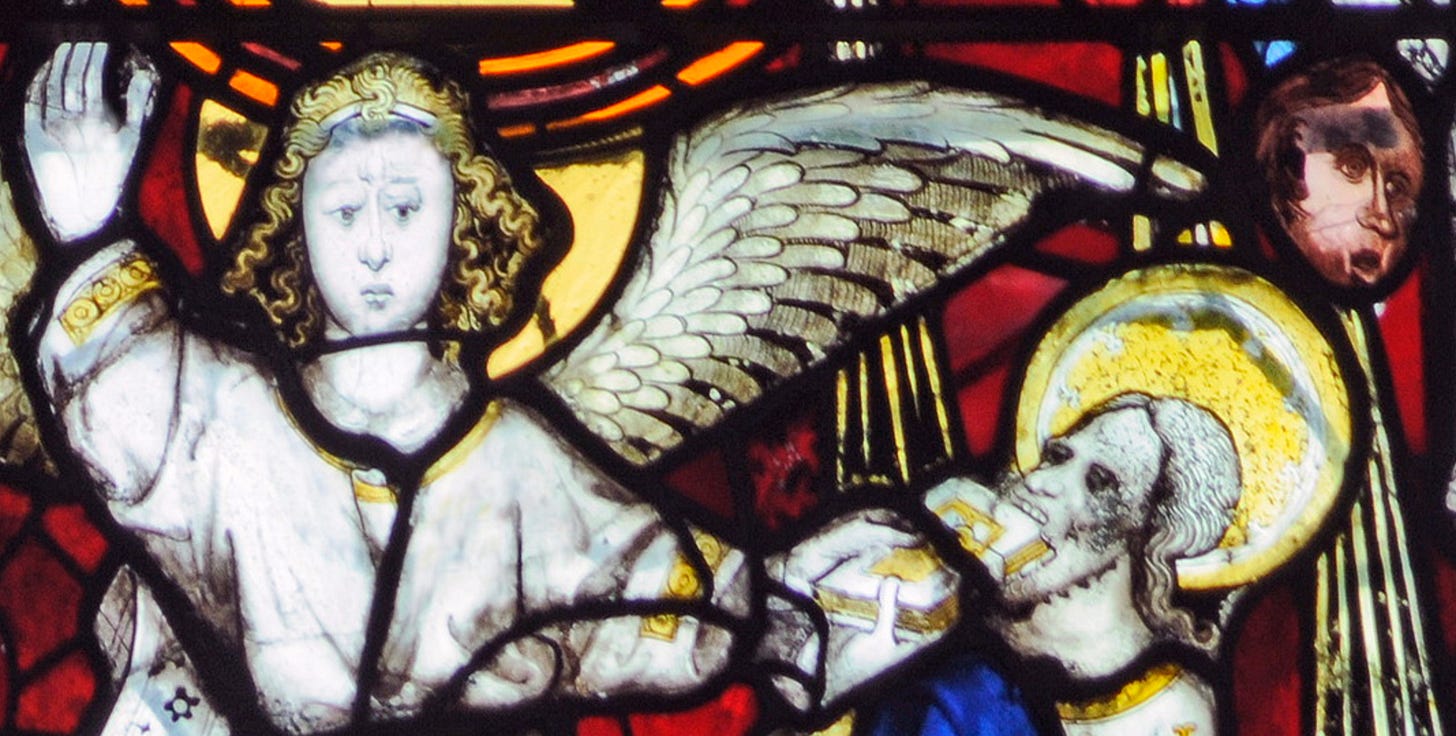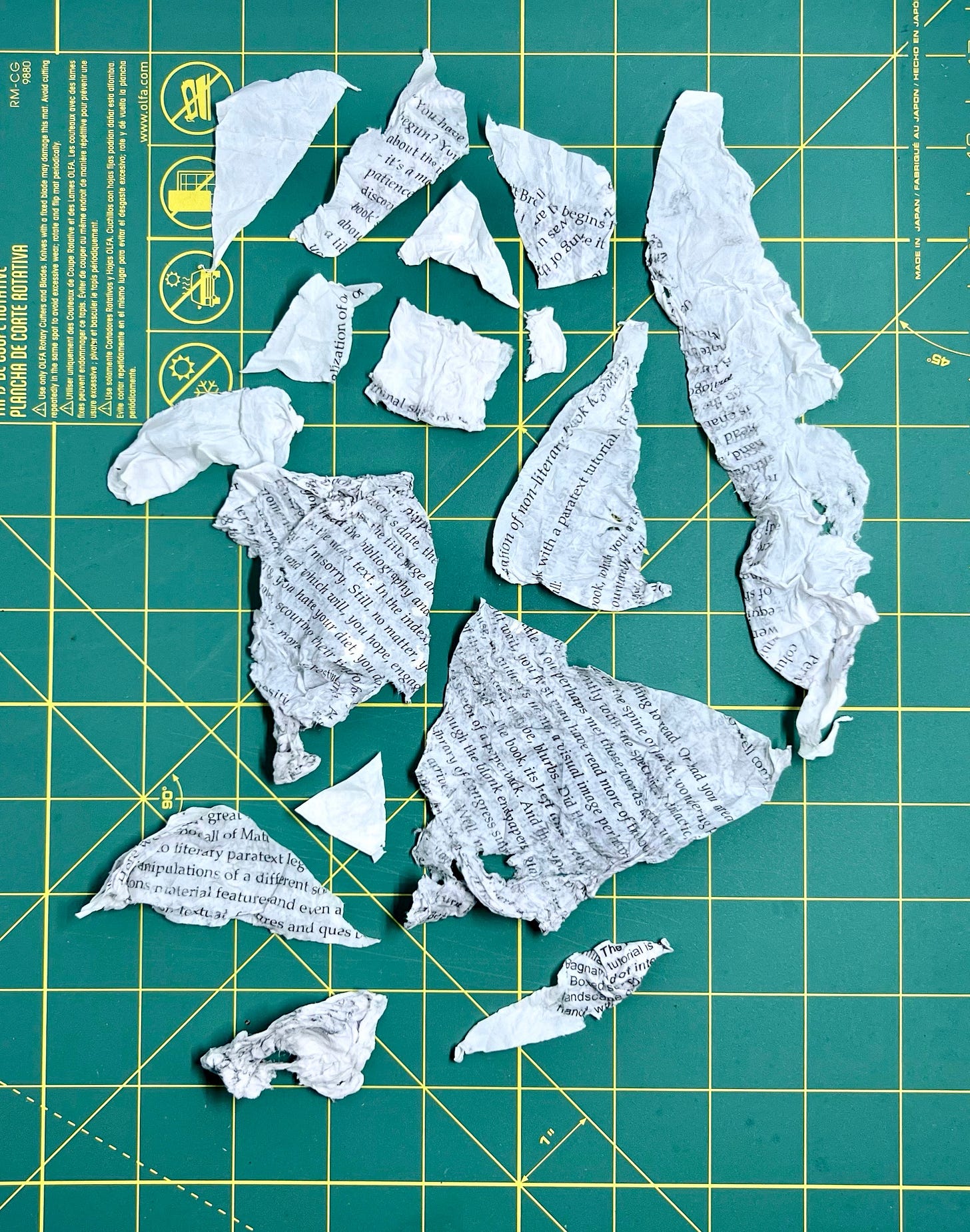God Told Me to Eat This Book
There are two ways to eat a book: metaphorically (“she devours mystery novels”) and literally (“she carried the coffee pot to the breakfast nook, where an Agatha Christie novel was sitting on the table, cover peeled back to expose the text. After a swing of coffee, she tore out the first leaf, mouthing the title page until the paper deflated and softened against her tongue. Another glug of coffee; with satisfaction, she consumed several chapters, relishing the crunch of each crispy, ragged edge. It was four years to the day since she had locked her husband in the attic. She poured him the last cup of coffee, placing it on a tray with a boiled egg, then hauled herself to the top flight to shove the tray through the cat door—but hesitated on the landing. Against her better judgement, after the tray, she tossed in half a mangled paperback. Did he even like mysteries these days?”)
As the above comparison illustrates, not all book eating is equally interesting. Literal book eating trumps metaphorical book eating every time: the second is a cliché. Rest assured, Papereaters, I researched it anyway. (For me, research isn’t part of the writing project—writing is part of the research project.) Though this list may not be exhaustive, below you’ll find my finest piece of culinary writing to date: five literal—and two metaphorical—reasons to eat books.
Why we eat books (literally)
Critique
When a book is so bad the reader must eat it; writing a bad review would imply the reader has intellectual objections to the author’s text, but it’s more than that: the reader does not disagree, or digress; instead, they digest. Because of its embodied nature, bookeating is an especially emphatic way to leave a negative review. In 1966, artist John Latham was fired from his teaching position at St. Martin’s School of Art for this type of literary criticism. The library book Latham masticated (a copy of art critic Clement Greenberg’s Art and Culture) is now in the collection of the MoMA.
Compulsion
Bookeating may result from a disorder known as pica, or the urge to eat non-edible substances. Papereating (xylophagia) is distinguished from other types of pica, such as acuphagia (eating sharp objects), cautopyreiophagia (burnt matches), coprophagia (feces), geomelophagia (raw potatoes), geophagia (earth), hyalophagia (glass), pagophagia (ice), and hematophagia (blood). Hand papermakers may be distressed by the etymology of the term xylophagia (xylo means ‘wood’), as it implies that those who compulsively eat paper are subjected to a diet of machine-made, wood-pulp papers—when handmade paper would be a more compelling choice. But rest assured that the compulsion to ingest wood has its own subtype: lignophagia.
Command from God
Hierophagy occurs twice in the Bible, whose two specific papereaters are the Prophet Ezekiel, and John the Evangelist. Both received a divine commandment to eat books. Hierophagy is a scenario all Papereaters should (a) be aware of and (b) prepare for: if it could happen to the Prophet Ezekiel, it could happen to any of us. According to the Biblical scholar Meredith Warren, you’ll know God has commanded you to eat a book if:
(1) a heavenly being offers
(2) something heavenly
(3) for a mortal
(4) to eat, which leads to
(5) change, particularly
(5a) translocation
(5b) transformation, and/or
(5c) the transmission of knowledge.
Depending on the translation, in the Bible Ezekiel and John eat either a scroll or a codex. Most visual depictions of biblical bookeating show a codex book.
Farce
Personally, this is the main reason I eat books. Most recently, I’ve been gnawing on a self-published book of essays by book conservator Gary Frost, entitled BookBehavior2. It’s easy to take yourself too seriously as a maker or reader of books, which is why occasionally, it’s important to eat one. All too often, we talk about books in the abstract—but what might a more concrete relationship to our reading material reveal?
Devotion
A book store owner in Boston hasn’t seen this regular customer since the beginning of the pandemic:
[One customer] literally would eat Bibles. She would tear pages out, put them in her mouth, and eat the word of God … she would only eat a Catholic Bible. She wouldn’t eat a King James version.
One of the things people don’t realize about West Street is that there’s a convent on West Street, and the nuns, they actually keep a specific Bible aside for her so that she doesn’t eat a lot of different ones.
She’s a really wonderful person. She actually told us once, she was getting dental work done and she wanted a chip of the Douay version put in her tooth. Again, it’s taking in the word of God.
Why we eat books (metaphorically)
Since eating books is a metaphor for reading them, it follows that bookeating is closely related to the meaning of the word “bookworm.” Merriam Webster has an informative breakdown of the origins of the term and its use over the centuries. As the writers of the dictionary elucidate, the word has never applied primarily to insects: “bookworm began its career as an insult, a wholly negative term for someone who reads too much … the sense of worm being used is the one applied to a human being who is an object of contempt.” Those who devoured books might have been considered “self-absorbed” and “idle”—and thus, “not esteemed in a society based on one's gains and accomplishments.” That is, capitalism cares about the hustle, not lazing about in an unread library.
In an early version of Webster’s dictionary, Noah Webster defined bookworm as “A student closely attached to books, or addicted to study; also, a reader without judgment.” In my view, there are far worse things for a reader to be, such as indifferent. If more readers suspended judgement, experimental books, publications, and literature might get more of a fighting chance. Though a cliché, the metaphorical eating of books might be characterized as a curious, and anti-capitalist, approach to the eating (ahem, reading) of books.
Coming soon to a newsletter near you …
creatives tell their (true) personal stories about eating paper
smelling books
microwave book cooking
Know someone who shouldn’t miss the next issues of Papereaters?








